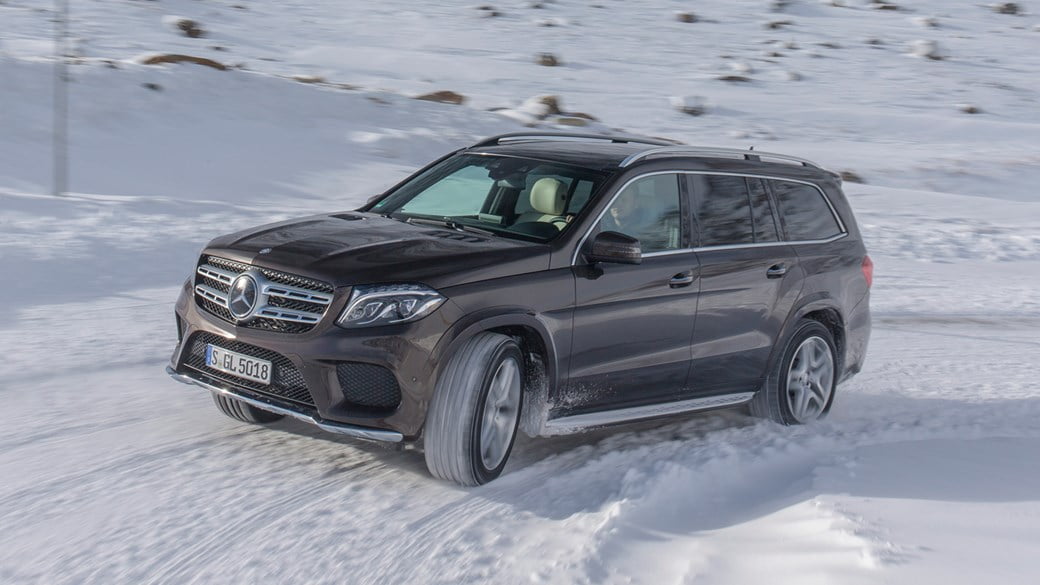
Déjà vu? If the new Mercedes GLS looks curiously familiar, that’s because it’s not quite a brand-new car, more a comprehensive facelift of the GL-class, Merc’s enormous seven-seater SUV.
The fresh three-letter name is part of Mercedes’ new-era filing system, the ‘S’ denoting that it’s the largest SUV the company makes, out-bulking the GLE, GLC, GLA and old-school G-class.
So it’s a new car in name only?
The short answer’s yes, although as mid-life overhauls go it’s a fairly comprehensive one, with a thorough facelift up front, more minor restyling work elsewhere, a refreshed interior and some detail chassis and drivetrain improvements. So there’s some underlying substance behind the name change.
Talk me through the GLS range
This won’t take long. In the UK, there’s just one ‘normal’ GLS, the GLS 350d 4matic, and one monster performance version, the Mercedes-AMG GLS63. We’re testing the former here.
The GLS 350d gets a 3.0 V6 diesel with 255bhp, and as the ‘4matic’ suffix suggests, it’s four-wheel-drive only. A nine-speed auto ’box is standard. While the drivetrain’s been made more fuel-efficient than that of the outgoing GL-class, you’ll still need a big wallet to run a GLS. Official CO2 output of 199g/km means a hefy tax bill whether you’re a private or a fleet driver, and while combined-cycle fuel economy’s an on-paper 37mpg, we’d be impressed if you topped 30mpg regularly on the road.
Two trim levels are available from launch – AMG Line (an AMG in bodykit only, not to be confused with the actual GLS63 performance model) and the plusher Disegno Line.
What’s the interior like? The pictures are giving me déjà vu again…
Okay, a polished-up version of the old GL’s cabin it might be, but fit and finish is hard to criticise, and it still feels really rather opulent. A new 8in screen’s appeared on the dash, and Merc’s current-generation touchpad has been grafted onto the centre console to navigate it. There are new instruments and a fresh steering wheel, too.
The seats are soporifically comfy, even if they do miss out on the S-class’s pillow-style headrests, and the first two rows are heated as standard.
Can you actually fit seven people inside?
You actually can; a six-foot passenger could sit in relative comfort in the two rearmost seats (which electrically stow themselves into the boot when you don’t need them). The middle row power-fold too, making access to the rear row easier.
What’s it like to drive?
With 457lb ft from 1600rpm, the V6 350d pulls as strongly as you’d expect. It can sound a little gruff when you really wring its neck, but why would you? It’s a car you’re unlikely to ever feel like driving quickly. It is quick, though; 0-62mph in 7.8sec for a car just shy of 2.5 tonnes is nothing short of a magic trick. And it’ll tow pretty much anything you can hitch to it.
In other Mercs we’ve tried the nine-speed automatic gearbox can get itself confused, but in the 350d we drove it seemed to have found some renewed focus, always finding the right gear at the right moment. The steering’s not brimming with feel but, again, it’s a seven-seat SUV.
A redevelopment of the standard ‘Airmatic’ air suspension has given the GLS a better handle on both ride comfort and body control than the old GL. You can choose exactly how cushiony you’d like the ride to be via the driving mode selector by the gearlever. Disegno trim gets ‘Active Curve’ as standard, an active roll-stabilisation program to keep the car flat and composed in fast corners, using clever adaptive anti-roll bars like the S-class saloon.
Can it cut it on the rough stuff?
It’s genuinely adept. We sampled a car on snow with the optional Off-road Package, with an extra ‘Off-road+’ traction control mode, a locking centre diff and low-range gearbox, and it conjured eye-opening traction. The pack also adds three additional heights for the air suspension, allowing a wading depth of up to 600mm.
Verdict
While it may be essentially the same car underneath, the Mercedes GLS makes several important strides forwards from the GL-class it replaces. The improved air suspension system has all but cured the previous car’s occasionally iffy ride quality, the interior is much improved and with endless personalisation possibilities with no-cost option, you’re unlikely to see two identical cars.
Would you spend upwards of £70,000 on one? If you need space and flexibility, perhaps you would. It’s a seven-seater that can actually seat seven, and thanks to a relatively narrow overall width it feels more nimble on the road than you might expect of a car of this size. It’s a more well-rounded product than the GL it replaces, even if our premium SUV money would still go on a Range Rover or Volvo XC90.
[“source-carmagazine”]




